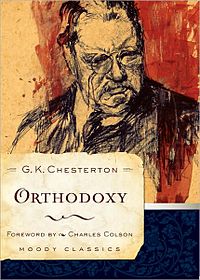- Orthodoxy (book)
-
Orthodoxy 
Author(s) G. K. Chesterton Country United Kingdom Language English Genre(s) Christian Apologetics Publication date 1908 Media type Print (Hardback & Paperback) ISBN N/A Orthodoxy (1908) is a book by G. K. Chesterton that has become a classic of Christian apologetics. Chesterton considered this book a companion to his other work, Heretics. In the book's preface Chesterton states the purpose is to "attempt an explanation, not of whether the Christian faith can be believed, but of how he personally has come to believe it." In it, Chesterton presents an original view of Christian religion. He sees it as the answer to natural human needs, the "answer to a riddle" in his own words, and not simply as an arbitrary truth received from somewhere outside the boundaries of human experience.
Contents
Analysis of the Text
The book is developed as an intellectual quest by a spiritually curious person. While looking for the meaning of life he finds truth that uniquely fulfills human needs. This is the truth revealed in Christianity. Chesterton likens this discovery to a man setting off from the south coast of England, journeying for many days, only to arrive at Brighton, the point he originally left from. He does not at first recognize it, and thinks he has discovered something new--only to find that it has been found by many before him. Such a man, he proposes, would see the wondrous place he grew up in with newly appreciative eyes. This is a common theme in Chesterton's works, and one which he gave fictional embodiment to in Manalive. It is also the way in which he describes his spiritual journey. He thought of himself as making a "blueprint" of what would be necessary in a religion, only to find that the structure had already been built and was standing in front of him--that structure is the Church.
The book has few quotations from (although many allusions to) Scripture. It also lacks authoritative statements by religious authorities. Chesterton sums up the essence of his intention in the introduction when he says, "When the word "orthodoxy" is used here it means the Apostles' Creed, as understood by everybody calling himself Christian until a very short time ago and the general historic conduct of those who held such a creed. I have been forced by mere space to confine myself to what I have got from this creed; I do not touch the matter much disputed among modern Christians, of where we ourselves got it. This is not an ecclesiastical treatise but a sort of slovenly autobiography. But if any one wants my opinions about the actual nature of the authority, Mr. G. S. Street has only to throw me another challenge, and I will write him another book." Still, the book's message is presented as an intellectual inquiry by an individual looking for an explanation to the mysteries of human existence that satisfies his own innate reason. Yet, after investigation Chesterton is not merely convinced that orthodoxy is the right answer for his needs, but that it is right for all.
Chapters
There are nine chapters[1]:
- Introduction in Defense of Everything Else
- The Maniac
- The Suicide of Thought
- The Ethics of Elfland
- The Flag of the World
- The Paradoxes of Christianity
- The Eternal Revolution
- The Romance of Orthodoxy
- Authority and the Adventurer
Notes
External links
- Outline of Orthodoxy
- Online text – Christian Classics Ethereal Library
- audio recording of Orthodoxy at Librivox
- Orthodoxy at Project Gutenberg
- Orthodoxy – EPUB/Kindle editions
Categories:- 1908 books
- Christian studies books
- Books by G. K. Chesterton
Wikimedia Foundation. 2010.
